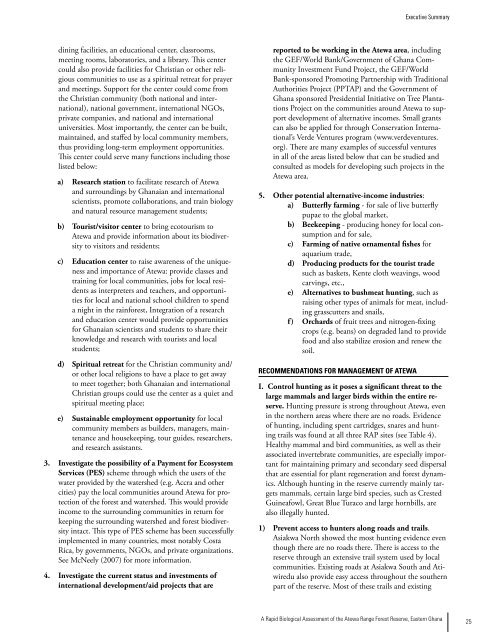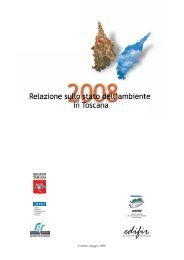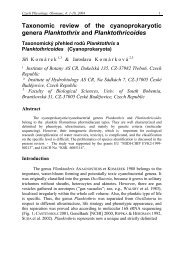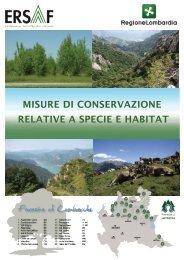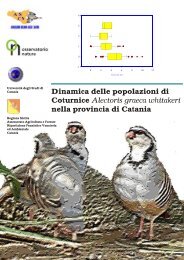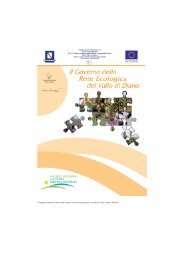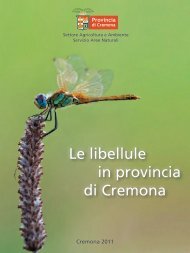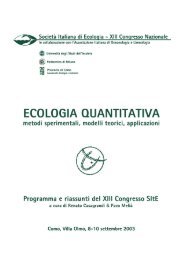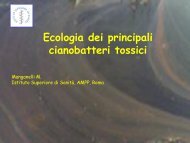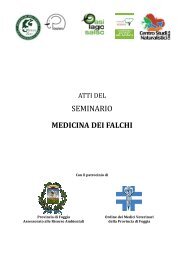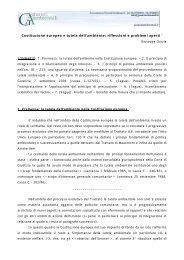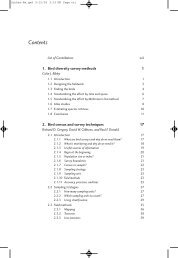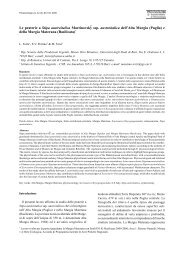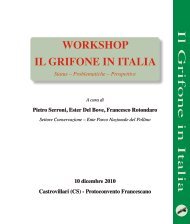Rapid survey of the birds of the Atewa Range Forest Reserve, Ghana
Rapid survey of the birds of the Atewa Range Forest Reserve, Ghana
Rapid survey of the birds of the Atewa Range Forest Reserve, Ghana
- No tags were found...
Create successful ePaper yourself
Turn your PDF publications into a flip-book with our unique Google optimized e-Paper software.
Executive Summary<br />
dining facilities, an educational center, classrooms,<br />
meeting rooms, laboratories, and a library. This center<br />
could also provide facilities for Christian or o<strong>the</strong>r religious<br />
communities to use as a spiritual retreat for prayer<br />
and meetings. Support for <strong>the</strong> center could come from<br />
<strong>the</strong> Christian community (both national and international),<br />
national government, international NGOs,<br />
private companies, and national and international<br />
universities. Most importantly, <strong>the</strong> center can be built,<br />
maintained, and staffed by local community members,<br />
thus providing long-term employment opportunities.<br />
This center could serve many functions including those<br />
listed below:<br />
a) Research station to facilitate research <strong>of</strong> <strong>Atewa</strong><br />
and surroundings by <strong>Ghana</strong>ian and international<br />
scientists, promote collaborations, and train biology<br />
and natural resource management students;<br />
b) Tourist/visitor center to bring ecotourism to<br />
<strong>Atewa</strong> and provide information about its biodiversity<br />
to visitors and residents;<br />
c) Education center to raise awareness <strong>of</strong> <strong>the</strong> uniqueness<br />
and importance <strong>of</strong> <strong>Atewa</strong>: provide classes and<br />
training for local communities, jobs for local residents<br />
as interpreters and teachers, and opportunities<br />
for local and national school children to spend<br />
a night in <strong>the</strong> rainforest, Integration <strong>of</strong> a research<br />
and education center would provide opportunities<br />
for <strong>Ghana</strong>ian scientists and students to share <strong>the</strong>ir<br />
knowledge and research with tourists and local<br />
students;<br />
d) Spiritual retreat for <strong>the</strong> Christian community and/<br />
or o<strong>the</strong>r local religions to have a place to get away<br />
to meet toge<strong>the</strong>r; both <strong>Ghana</strong>ian and international<br />
Christian groups could use <strong>the</strong> center as a quiet and<br />
spiritual meeting place;<br />
e) Sustainable employment opportunity for local<br />
community members as builders, managers, maintenance<br />
and housekeeping, tour guides, researchers,<br />
and research assistants.<br />
3. Investigate <strong>the</strong> possibility <strong>of</strong> a Payment for Ecosystem<br />
Services (PES) scheme through which <strong>the</strong> users <strong>of</strong> <strong>the</strong><br />
water provided by <strong>the</strong> watershed (e.g. Accra and o<strong>the</strong>r<br />
cities) pay <strong>the</strong> local communities around <strong>Atewa</strong> for protection<br />
<strong>of</strong> <strong>the</strong> forest and watershed. This would provide<br />
income to <strong>the</strong> surrounding communities in return for<br />
keeping <strong>the</strong> surrounding watershed and forest biodiversity<br />
intact. This type <strong>of</strong> PES scheme has been successfully<br />
implemented in many countries, most notably Costa<br />
Rica, by governments, NGOs, and private organizations.<br />
See McNeely (2007) for more information.<br />
4. Investigate <strong>the</strong> current status and investments <strong>of</strong><br />
international development/aid projects that are<br />
reported to be working in <strong>the</strong> <strong>Atewa</strong> area, including<br />
<strong>the</strong> GEF/World Bank/Government <strong>of</strong> <strong>Ghana</strong> Community<br />
Investment Fund Project, <strong>the</strong> GEF/World<br />
Bank-sponsored Promoting Partnership with Traditional<br />
Authorities Project (PPTAP) and <strong>the</strong> Government <strong>of</strong><br />
<strong>Ghana</strong> sponsored Presidential Initiative on Tree Plantations<br />
Project on <strong>the</strong> communities around <strong>Atewa</strong> to support<br />
development <strong>of</strong> alternative incomes. Small grants<br />
can also be applied for through Conservation International’s<br />
Verde Ventures program (www.verdeventures.<br />
org). There are many examples <strong>of</strong> successful ventures<br />
in all <strong>of</strong> <strong>the</strong> areas listed below that can be studied and<br />
consulted as models for developing such projects in <strong>the</strong><br />
<strong>Atewa</strong> area.<br />
5. O<strong>the</strong>r potential alternative-income industries:<br />
a) Butterfly farming - for sale <strong>of</strong> live butterfly<br />
pupae to <strong>the</strong> global market,<br />
b) Beekeeping - producing honey for local consumption<br />
and for sale,<br />
c) Farming <strong>of</strong> native ornamental fishes for<br />
aquarium trade,<br />
d) Producing products for <strong>the</strong> tourist trade<br />
such as baskets, Kente cloth weavings, wood<br />
carvings, etc.,<br />
e) Alternatives to bushmeat hunting, such as<br />
raising o<strong>the</strong>r types <strong>of</strong> animals for meat, including<br />
grasscutters and snails,<br />
f) Orchards <strong>of</strong> fruit trees and nitrogen-fixing<br />
crops (e.g. beans) on degraded land to provide<br />
food and also stabilize erosion and renew <strong>the</strong><br />
soil.<br />
Recommendations for Management <strong>of</strong> <strong>Atewa</strong><br />
I. Control hunting as it poses a significant threat to <strong>the</strong><br />
large mammals and larger <strong>birds</strong> within <strong>the</strong> entire reserve.<br />
Hunting pressure is strong throughout <strong>Atewa</strong>, even<br />
in <strong>the</strong> nor<strong>the</strong>rn areas where <strong>the</strong>re are no roads. Evidence<br />
<strong>of</strong> hunting, including spent cartridges, snares and hunting<br />
trails was found at all three RAP sites (see Table 4).<br />
Healthy mammal and bird communities, as well as <strong>the</strong>ir<br />
associated invertebrate communities, are especially important<br />
for maintaining primary and secondary seed dispersal<br />
that are essential for plant regeneration and forest dynamics.<br />
Although hunting in <strong>the</strong> reserve currently mainly targets<br />
mammals, certain large bird species, such as Crested<br />
Guineafowl, Great Blue Turaco and large hornbills, are<br />
also illegally hunted.<br />
1) Prevent access to hunters along roads and trails.<br />
Asiakwa North showed <strong>the</strong> most hunting evidence even<br />
though <strong>the</strong>re are no roads <strong>the</strong>re. There is access to <strong>the</strong><br />
reserve through an extensive trail system used by local<br />
communities. Existing roads at Asiakwa South and Atiwiredu<br />
also provide easy access throughout <strong>the</strong> sou<strong>the</strong>rn<br />
part <strong>of</strong> <strong>the</strong> reserve. Most <strong>of</strong> <strong>the</strong>se trails and existing<br />
A <strong>Rapid</strong> Biological Assessment <strong>of</strong> <strong>the</strong> <strong>Atewa</strong> <strong>Range</strong> <strong>Forest</strong> <strong>Reserve</strong>, Eastern <strong>Ghana</strong><br />
25


